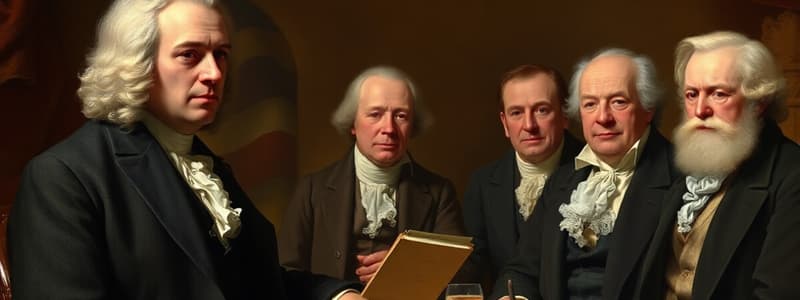Podcast
Questions and Answers
John Adams's role in which of the following events demonstrates his influence prior to becoming president?
John Adams's role in which of the following events demonstrates his influence prior to becoming president?
- Convincing George Washington to lead the Continental Army. (correct)
- Drafting the Bill of Rights for the U.S. Constitution.
- Leading the American forces during the Revolutionary War.
- Negotiating the Louisiana Purchase with France.
What was John Adams's political affiliation?
What was John Adams's political affiliation?
- Democratic-Republican
- Anti-Federalist
- Federalist (correct)
- Whig
Which prior experience might have negatively impacted John Adams's effectiveness as president?
Which prior experience might have negatively impacted John Adams's effectiveness as president?
- Serving as a diplomat in England. (correct)
- Attending Harvard University.
- Working alongside Thomas Jefferson.
- Practicing law in Massachusetts.
Besides being the second president, which prior role did John Adams hold in the U.S. government?
Besides being the second president, which prior role did John Adams hold in the U.S. government?
What distinguishes John Adams from other Founding Fathers, based on the information provided?
What distinguishes John Adams from other Founding Fathers, based on the information provided?
Which action by John Adams was MOST driven by his distrust of the common people and preference for educated governance?
Which action by John Adams was MOST driven by his distrust of the common people and preference for educated governance?
In what way did the circumstances surrounding John Adams's occupation of the Executive Mansion MOST reflect the challenges facing the early US government?
In what way did the circumstances surrounding John Adams's occupation of the Executive Mansion MOST reflect the challenges facing the early US government?
How did the Alien and Sedition Acts directly conflict with the principles upon which the United States was founded?
How did the Alien and Sedition Acts directly conflict with the principles upon which the United States was founded?
Which statement BEST explains the differing views of the Federalists and Democratic-Republicans regarding foreign relations during Adam's presidency?
Which statement BEST explains the differing views of the Federalists and Democratic-Republicans regarding foreign relations during Adam's presidency?
What was the intended outcome of the Alien and Sedition Acts, according to the context of the content?
What was the intended outcome of the Alien and Sedition Acts, according to the context of the content?
What does George Washington's approach to establishing the presidency reveal about his understanding of the role he was undertaking?
What does George Washington's approach to establishing the presidency reveal about his understanding of the role he was undertaking?
How did the composition of George Washington's first cabinet reflect the political landscape of the time?
How did the composition of George Washington's first cabinet reflect the political landscape of the time?
How did the results of the first census in 1790 MOST reflect the socio-economic characteristics of the early United States?
How did the results of the first census in 1790 MOST reflect the socio-economic characteristics of the early United States?
What action best exemplifies Washington's understanding of the importance of setting precedents as the first president?
What action best exemplifies Washington's understanding of the importance of setting precedents as the first president?
How did Washington's initial journey to New York City for his inauguration demonstrate the public's sentiment towards him?
How did Washington's initial journey to New York City for his inauguration demonstrate the public's sentiment towards him?
Why might John Adams's actions regarding France and England be considered the MOST consequential of his presidency?
Why might John Adams's actions regarding France and England be considered the MOST consequential of his presidency?
How did the circumstances surrounding Washington's death indirectly contribute to the development of the nation's capital?
How did the circumstances surrounding Washington's death indirectly contribute to the development of the nation's capital?
Which of the following BEST describes how the size and composition of the federal government under Washington differed from that of his own estate at Mount Vernon?
Which of the following BEST describes how the size and composition of the federal government under Washington differed from that of his own estate at Mount Vernon?
If the US population continued to double every 24 years as it did in its early years, approximately what population could have been projected by the census of 1914?
If the US population continued to double every 24 years as it did in its early years, approximately what population could have been projected by the census of 1914?
Which attribute MOST accurately reflects a commonality between the presidencies of George Washington and John Adams?
Which attribute MOST accurately reflects a commonality between the presidencies of George Washington and John Adams?
Flashcards
Who was John Adams?
Who was John Adams?
Second president of the United States, serving from 1797-1801.
Adams' role before presidency?
Adams' role before presidency?
He was George Washington's Vice President before becoming President.
John Adams' political party?
John Adams' political party?
He belonged to the Federalist Party.
From which state was Adams?
From which state was Adams?
Signup and view all the flashcards
Adams' presidential legacy?
Adams' presidential legacy?
Signup and view all the flashcards
Executive Mansion
Executive Mansion
Signup and view all the flashcards
Alien and Sedition Acts
Alien and Sedition Acts
Signup and view all the flashcards
The Alien Act
The Alien Act
Signup and view all the flashcards
The Sedition Act
The Sedition Act
Signup and view all the flashcards
Neutrality
Neutrality
Signup and view all the flashcards
Presidential Cabinet
Presidential Cabinet
Signup and view all the flashcards
Thomas Jefferson
Thomas Jefferson
Signup and view all the flashcards
Alexander Hamilton
Alexander Hamilton
Signup and view all the flashcards
Henry Knox
Henry Knox
Signup and view all the flashcards
Census
Census
Signup and view all the flashcards
First US Census (1790)
First US Census (1790)
Signup and view all the flashcards
George Washington
George Washington
Signup and view all the flashcards
John Adams
John Adams
Signup and view all the flashcards
Presidential Precedent
Presidential Precedent
Signup and view all the flashcards
Edmund Randolph
Edmund Randolph
Signup and view all the flashcards
Study Notes
John Adams' Background
- John Adams served as the second president, from 1797 to 1801
- He was George Washington's Vice President
- Adams was a Federalist from Massachusetts
- Adams was highly qualified, having been educated at Harvard and worked as a lawyer
- He persuaded Washington to be the general and Jefferson to write the Declaration of Independence
- He worked as a diplomat to England
- Despite his qualifications, he wasn't considered a great president, possibly due to spending too much time in England, which led to him becoming vain and adopting British customs
- Adams, like Hamilton, believed only the educated should govern and distrusted the common people, and he was wary of democracy
- Ben Franklin described Adams as honest and wise, but occasionally out of his senses
The Executive Mansion
- John Adams was the first president to reside in the Executive Mansion (later known as the White House)
- At the time, the Federal City was still under construction, and Adams got lost trying to find the mansion in the woods
- Despite the surrounding woods, there was insufficient wood for the fireplaces, and Adams, who opposed slavery, struggled to find laborers to cut wood
- The house was damp and cold
- Adams spent more time in Massachusetts than in Washington, D.C
- For example, Adams spent 385 days away in 4 years
Washington's Death
- George Washington died in 1799 after falling ill after a ride
- Attempts to heal him by bleeding him were unsuccessful
- Washington's last words were, "I die hard, but I am not afraid to go"
- His death shocked and grieved Americans
- Richard Henry Lee said, "Washington was first in war, first in peace, first in the hearts of his countrymen"
- After his death, the Federal City was named Washington, D.C.
Alien and Sedition Acts
- John Adams considered keeping the U.S. out of war his most important accomplishment
- When France and England fought, the U.S. remained neutral, angering the French, who then captured U.S. ships
- In 1798, Congress passed the Alien and Sedition Acts as a result
The Alien Act
- The Alien Act made it harder for foreigners to become U.S. citizens
- It targeted French immigrants fleeing the French Revolution, who were often Catholic
- Many of these immigrants joined the Democratic-Republicans, while the Federalists favored England
- The Alien Act sought to weaken the Democratic-Republicans
The Sedition Act
- The Sedition Act criminalized criticizing the government
- It was enacted because some people accused Adams of acting like a king, even calling him "His Rotundity"
- This act prevented Democratic-Republicans from speaking out against Adams
- The Sedition Act sought to weaken the Democratic-Republicans
Unconstitutionality
- The Sedition Act was considered unconstitutional as it violated the First Amendment's guarantees of freedom of speech and the press
- The Supreme Court was too weak to intervene at the time
First Inauguration
- George Washington was unanimously elected as the first president at 57 years old
- He was reluctant to leave his home at Mount Vernon
- Out of a sense of duty, he accepted the presidency
- It took him eight days to travel 235 miles to New York City
- Each town greeted Washington with parades, bonfires, fireworks, speeches, and more
- Near Philly, he switched from a carriage to a white horse
- In NYC, he arrived via a barge decorated with streamers and amid ringing church bells, cannons, and cheering crowds
- On April 30, 1789, Washington wore a plain brown suit made of American cloth
- On the balcony of Federal Hall, he bowed to the crowd, put his hand on his heart, and swore to "Preserve, protect and defend the Constitution of the US"
- Afterwards, he and Congress walked to St. Paul's Church to pray for guidance
First President
- George Washington had no precedent for his role
- He understood that his actions would set a standard for future presidents
- He said, "I walk on untrodden ground. There is scarcely any part of my conduct which may not hereafter be drawn into precedent"
- He aimed to earn the respect and admiration for the president
- Washington rode in a yellow carriage pulled by six white horses with meticulously groomed coats, hooves, and teeth
- At official receptions, he wore velvet knee breeches, yellow gloves, silver-buckled shoes, and a dress sword
First Cabinet
- As head of the executive branch, Washington appointed advisors known as the Cabinet
- Cabinet appointments included:
- Thomas Jefferson as Secretary of State
- Alexander Hamilton as Secretary of the Treasury
- Henry Knox as Secretary of War
- Edmund Randolph as Attorney General
- Samuel Osgood as Postmaster General
- Congressman James Madison aided Washington with his speeches
- Madison also wrote speeches for Congress
- Vice President John Adams also advised Washington
- The federal government consisted of only 350 people, just over 100 more than at Mount Vernon
First Cencus
- The first census occurred in 1790, starting a tradition of doing so every 10 years
- The census counted 4 million people, including 700,000 slaves, but excluded Native Americans
- Benjamin Franklin died in 1790 and was not counted in the census
- 95% of the population lived on farms
- Roughly 1 million people lived in the frontier
- Port cities were the main cities
- America had a higher birth rate and lower death rate than England
- The healthy environment contributed to high population growth
- For almost a century, the U.S. population doubled every 24 years
- The population was 4 million in 1790 and 63 million in 1890
Studying That Suits You
Use AI to generate personalized quizzes and flashcards to suit your learning preferences.




